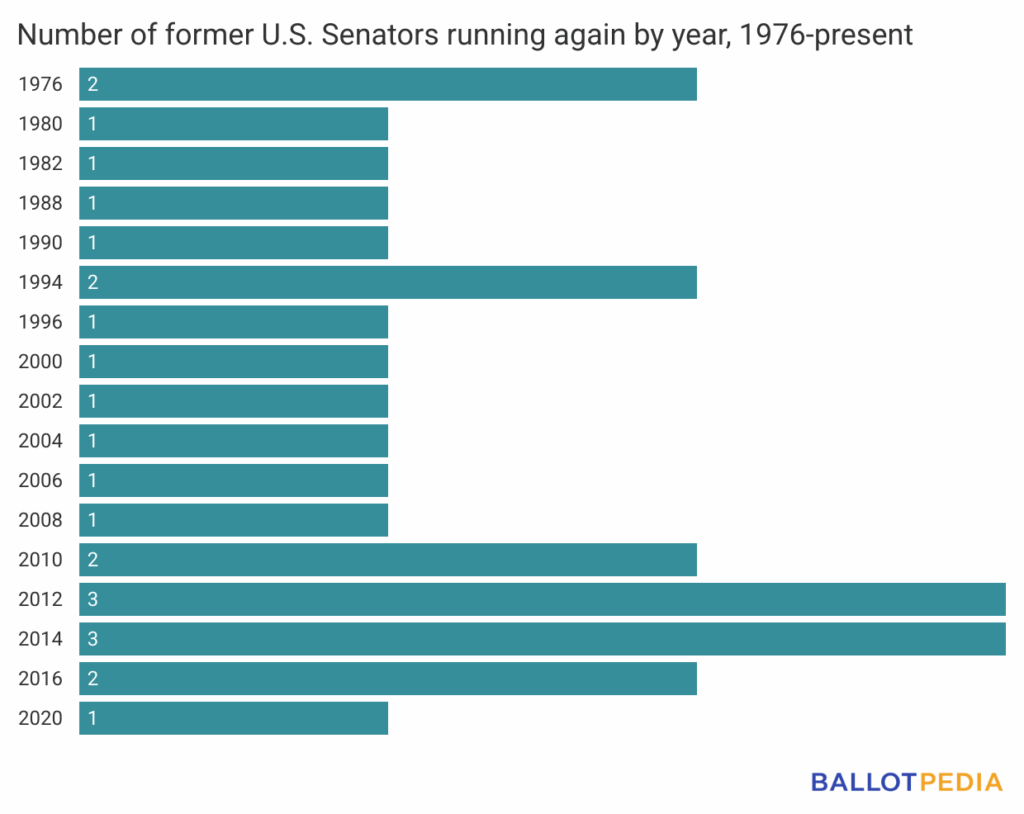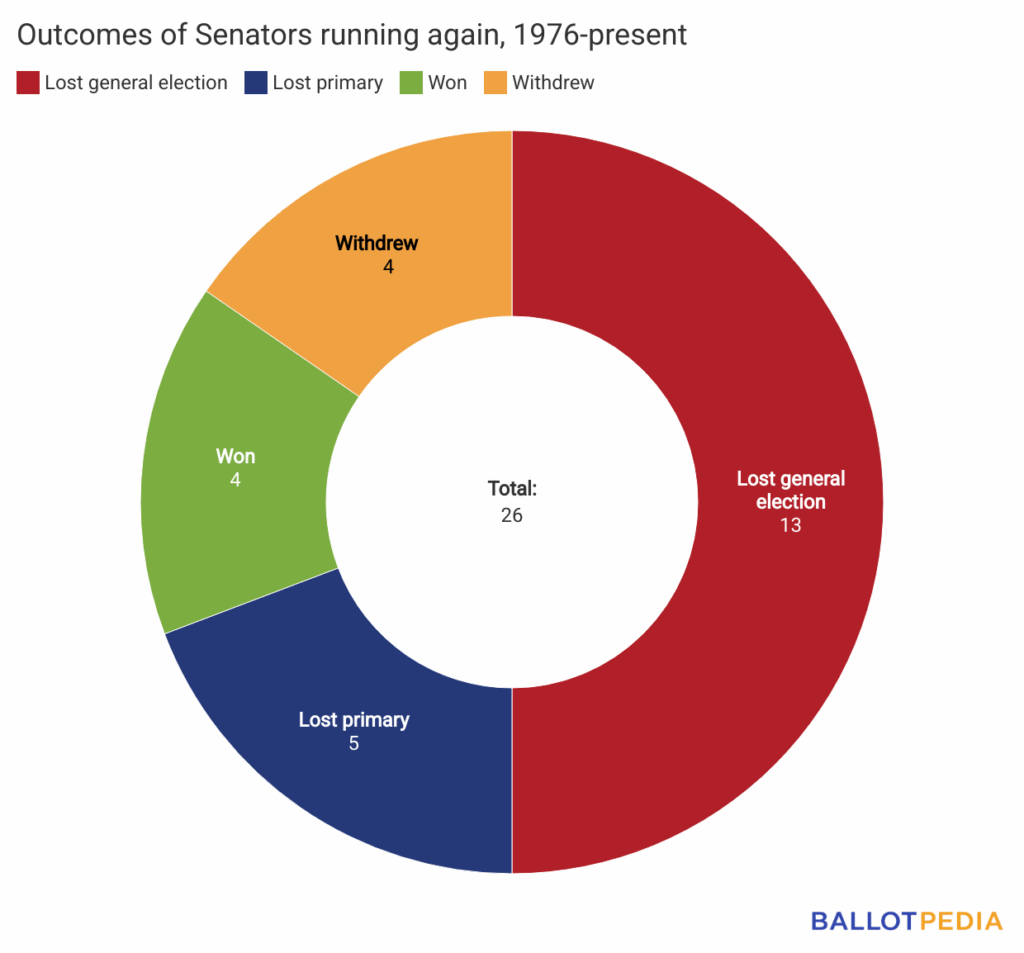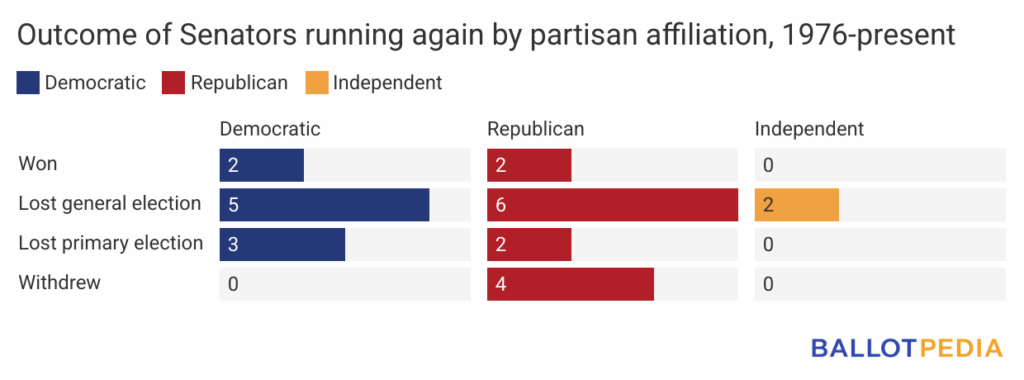Daily Brew: September 22, 2025
Welcome to the Monday, Sept. 22, 2025, Brew.
By: Lara Bonatesta
Here’s what’s in store for you as you start your day:
- 2026 could have the most Senators run again after leaving office since 2012 and 2014
- Jacob Frey, Omar Fateh, and 13 others, running in Minneapolis mayoral election
- The latest on the races for Virginia Governor and Pennsylvania Supreme Court
2026 could have the most Senators run again after leaving office since 2012 and 2014
On Sept. 3, former U.S. Senator John E. Sununu (R-N.H.) told WMUR TV that he is considering entering the 2026 U.S. Senate race in New Hampshire. If Sununu runs, he would be the second former Senator to announce a bid for the seat. Former U.S. Sen. Scott Brown (R), who previously represented Massachusetts, announced his campaign in June. Incumbent Jeanne Shaheen (D), who defeated Sununu in 2008, is retiring.
If Sununu enters, these two wouldn’t be the only Senators running for Senate again, as former Ohio Senator Sherrod Brown (D) is running after he lost to Bernie Moreno (R) in 2024. Additionally, 2026 would have the most former Senators running since 2012 and 2014, when three former Senators ran. Click here to read more about the 2026 U.S. Senate elections.

Excluding Scott Brown's and Sherrod Brown's current candidacies, at least 24 Senators have run again in 26 elections after leaving office since 1976. Twelve were Republicans, 10 were Democrats, and two were independents.

Thirteen senators (or 50%) lost in general elections, five (or 19%) lost in primaries, four (or 15%) withdrew from the primaries, and four (or 15%) won.

On average, Senators ran seven years after leaving office. Some notable Senators who ran again include former Vice President Walter Mondale (D), former U.S. Attorney General Jeff Sessions (R), and former Presidential candidate Eugene McCarthy (D).
There have been several elections in which Senators ran against each other. Two were rematches: Wisconsin in 2016, when Ron Johnson (R) defeated Russ Feingold (D), and Minnesota in 1996, when Paul Wellstone (D) defeated Rudy Boschwitz (R). In 2014, two Senators ran for the nomination for New Hampshire’s Senate seat. Scott Brown (R) won the Republican nomination, defeating nine other candidates, including former Senator Bob Smith (R).
Following the 2024 general elections, Republicans have a 53-45-2 majority in the U.S. Senate. There are 33 Senate seats up for election in November 2026. Of those, Democrats currently hold 13 seats and Republicans hold 20. Democrats are defending two seats in states that Donald Trump (R) won in the 2024 presidential election: Georgia and Michigan. Republicans are defending one seat in a state that Kamala Harris (D) won: Maine.
Click here to read more about the 2026 U.S. Senate elections.
Jacob Frey, Omar Fateh, and 13 others, running in Minneapolis mayoral election
Incumbent Jacob Frey (D), Omar Fateh (D), and 13 other candidates are running in the nonpartisan general election for mayor of Minneapolis, Minnesota, on Nov. 4.
Elections in Minneapolis are officially nonpartisan, but the Minneapolis City Charter allows mayoral and city council candidates to choose a party label to appear below their name on the official ballot.
Frey was first elected in 2017, defeating incumbent Betsy Hodges (D) in the fifth round of ranked-choice voting. Frey, a member of the Democratic-Farmer-Labor Party (DFL), says he is a pragmatic progressive. He says, "I’m running because with everything going on in the world, experience matters. ... I have stood up for what’s best for our city even when it was not politically expedient to do so.”
Fateh is also a DFL member and says he is a democratic socialist. He was elected to the Minnesota Senate, representing District 62, in 2020. Fateh says, "We deserve leadership that makes it so people want to continue to live here, raise families here, and start businesses here."
While the city's mayor has been a DFL member since 1978, this election has highlighted divisions within the larger party. Local media outlets have described the split as between democratic socialists or progressives and moderate or establishment democrats, with Fateh belonging to the former group and Frey belonging to the latter. On July 19, the Minneapolis DFL endorsed Fateh at a convention, which Fox 9's Kilat Fitzgerald said included the party's "symbolic vote of confidence, as well as volunteer power, to put toward [Fateh's] efforts to win the race." This was the first time the Minneapolis DFL endorsed a mayoral candidate since 2009, as an endorsement requires a candidate to win at least 60% of delegates.
Frey's supporters challenged the endorsement process, alleging there were issues with the electronic voting system. The statewide DFL reviewed the challenges and revoked the endorsement on Aug. 21. Fateh said, "Twenty-eight party insiders voted to take away our endorsement behind closed doors. This group was composed of non-Minneapolis residents, Mayor Frey supporters, and even donors." Frey said, "I am proud to be a member of a party that believes in correcting our mistakes, and I am glad that this inaccurate and obviously flawed process was set aside."
Party divisions predate Fateh's revoked endorsement. Following the killing of George Floyd in Minneapolis on May 25, 2020, the Democratic city council disagreed with Frey on policing policies. Specifically, a majority of the city council signed a pledge to disband the city’s police department. Frey opposed the pledge. According to the MinnPost, "A coalition of Minneapolis candidates fueled by left-wing energy and skepticism of the status quo at City Hall secured a majority on the City Council [during the 2023] municipal elections, winning seven of 13 seats." As of Sept. 9, five of the seven progressive council members endorsed Fateh, as well as one council member, Jamal Osman (D), who was not aligned with either the seven progressive council members or council members who typically support Frey. Three council members who typically support Frey endorsed him.
Also running in the general are Andrea Revel, Troy Peterson, Kevin Ward, Xavier Pauke, Adam Terzich, Kevin A. Dwire, Charlie McCloud, Alejandro Richardson, Laverne Turner, Jeffrey Wagner, DeWayne Davis, Jazz Hampton, and Brenda Short.
Minneapolis uses ranked-choice voting to elect city officials. Voters can rank up to three mayoral candidates on their ballots. Click here to learn more about how ranked-choice voting works in this election.
Minneapolis has a strong mayor-council system. The city council serves as the city's primary legislative body and the mayor is considered the city's chief executive.
Click here to read more about the mayoral election in Minneapolis.
The latest on the races for Virginia Governor and Pennsylvania Supreme Court
As November grows closer, candidates and satellite groups are kicking their election spending into high gear. Here’s a look at some recent spending updates in two notable statewide races: Virginia Governor and Pennsylvania Supreme Court.
Virginia Governor
According to the Virginia Public Access Project, Democrat Abigail Spanberger has raised $41.2 million to Republican Winsome Earle-Sears’ $16.8 million in Virginia’s gubernatorial race. Spanberger has $12.2 million cash on hand while Earle-Sears has $4.9 million.
Virginia does not limit individual contributions to campaigns for state and local offices. It is one of 12 states that don’t limit contributions to gubernatorial campaigns. Here’s a look at some of the election spending, starting with the most recent:
- On Sept. 16, the Washington Post reported that the Democratic Governors Association Action Fund had spent $3 million supporting Spanberger. On Sept. 16, Politico reported that the Republican Governors Association is spending $1 million on TV ads in the D.C. television market, $1 million on digital ads, and a total of $2.7 million on TV ads statewide.
- On Sept. 16, the Washington Post also reported that incumbent Gov. Glenn Youngkin (R) donated $100,000 to Earle-Sears’ campaign.
- On Aug. 29, Politico reported that Black Entertainment Television co-founder Robert Johnson donated $500,000 to the Earle-Sears campaign. Johnson’s donation came after a protester held up a sign that he called a “racist diatribe” when Earle-Sears spoke at an Arlington school board meeting. Johnson previously supported Democrats, including former Gov. Terry McAuliffe and 2016 presidential candidate Hillary Clinton.
- Other large donations for Spanberger include a $500,000 donation from VoteVets, an organization that says it supports “veteran candidates who will fight for progressive values,” and another $500,000 donation from Sports Betting Alliance, which says it believes “customers in all 50 states should enjoy the benefits of transparent and legal sports betting and online casino gaming.” According to the Virginia Public Access Project, LinkedIn co-founder Reid Hoffman also donated $390,000 to Spanberger’s campaign.
According to the Virginia Public Access Project, in the 2021 election, when Glenn Youngkin (R) defeated Terry McAuliffe (D) 50.6%-48.6%, Youngkin spent $68.2 million and McAuliffe spent $69.3 million. Satellite groups spent $1.7 million supporting Youngkin and $412,000 opposing him. Satellite groups spent $168,000 supporting McAuliffe and $2.8 million opposing him.
Pennsylvania Supreme Court:
In Pennsylvania, three Democratic supreme court justices are up for a retention vote. While the state initially uses partisan elections to select a justice, justices running for re-election face retention votes. A retention election is a type of election in which voters are asked whether an incumbent judge should remain in office for another term. The judge does not face an opponent. Pennsylvania is one of eight states to use partisan elections for the initial selection of a justice and one of 22 to use retention elections to renew a term. In Pennsylvania, judges serve 10-year terms.
Both parties and party-affiliated groups have spent money on the race.
- The Democratic Legislative Campaign Committee announced on Sept. 15 that it would spend up to six figures in this race to support the justices’ retention. Additionally, according to The New York Times, Democratic-aligned groups have booked $3 million in television ads until the election.
- According to Spotlight PA, the Republican State Leadership Committee has spent $85,000 on social media ads to oppose retention.
The last retention election in Pennsylvania was in 2017, coinciding with a partisan election on the same ballot. While both candidates in the partisan election spent more than $900,000, the retention election candidates spent much less, with one spending more than $200,000 and another who reported spending nothing.
To read more about Virginia’s gubernatorial election, click here. To read more about Pennsylvania’s Supreme Court election, click here.



